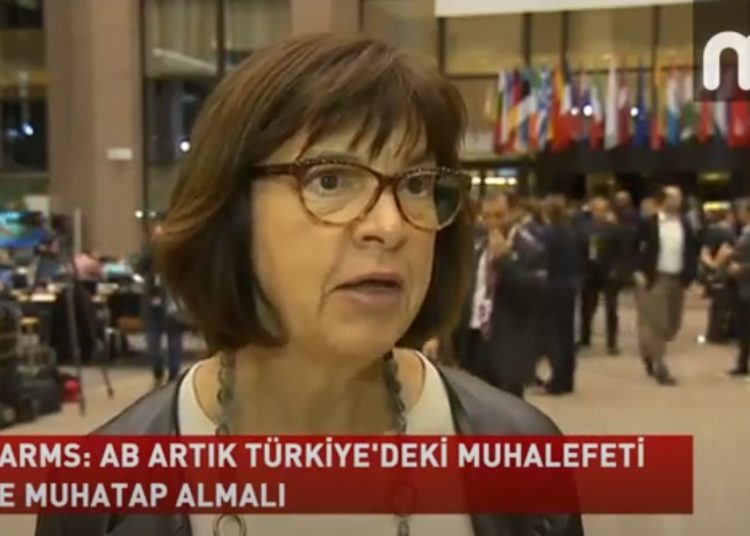Abdullah Bozkurt/Stockholm
A secret Turkish intelligence report has revealed that the government of President Recep Tayyip Erdoğan kept a close eye on a dissident TV network broadcasting out of Germany and initiated sham criminal investigations into the journalists who appeared on their shows.
MC EU, licensed in Germany’s Hesse state and available on satellite and the Internet, is run by journalists who were formerly affiliated with Samanyolu TV, one of the major networks in Turkey before it was shut down by the government in 2016. The report, dated October 10, 2017, was prepared by the Security Department (Güvenlik Dairesi) of the Security General Directorate (Emniyet) and signed by Cüneyt Ünal, the head of the department, on October 14.
The report was shared with the Presidential Protection Department, suggesting that President Erdoğan’s office was quite bothered by the critical coverage of MC EU. The report underlined that the channel was an important source of information for gathering intelligence on dissidents abroad. In the 12-page intelligence report, the Turkish authorities especially focused on three Turkish journalists whose commentates had put Turkey in a difficult position.
Cover letter for the intelligence report signed by the head of the Security Department:
It collected intelligence on prominent journalists who appeared on the network such as Ekrem Dumanlı, who moved into exile in the US after he was briefly detained when he was the editor-in-chief of Zaman, Turkey’s best selling national daily before its seizure by the government.
Another target was Erkam Tufan Aytav, a Swedish-based Turkish journalist who used to have a popular current affairs program in Turkey on Bugün TV before moving into exile. Bugün TV was seized by the Erdoğan government in 2015, and Aytav moved to Sweden a year later to escape wrongful prosecution and imprisonment. He currently runs a a popular news commentary program on his own YouTube channel. Fatih Gök is another journalist who was targeted in the report.

Leading figures of the Gülen movement, a government critic, were also named in the report for appearing on the network to share their views. Some of the people who were profiled, such as Abdullah Ayamaz, a columnist for the now-defunct Zaman daily, and Mehmet Ali Şengül have long lived in Germany. Reşit Haylamaz and Harun Tokak recently moved abroad after the Erdoğan government’s unprecedented crackdown on opposition groups.
Intelligence report naming critical journalists as targets of the Turkish authorities:
All the journalists named in the report face arrest warrants on sham terrorism charges in Turkey. They risk imprisonment if they ever go back to their home country, and their assets are subject to seizure by the government.
According to the report the Turkish authorities also tried to locate the social media accounts of the MC EU network and filed false password reset requests with the network’s registered user on Twitter.
Selçuk Akbulut, a German national of Turkish origin, was identified as the owner of the registration for the MC EU network website and listed as the manager of Itep Pictures GmbH. Akbulut had long been employed by the Samanyolu network, which was based in Turkey. The Turkish government killed the network by removing it from government-owned satellite operator Turksat and cancelled its license in 2015. It was shut down altogether in 2016.
The report shows the Turkish government tried to hack into the network’s social media accounts:
Turkey is ranked 154th out of 180 countries in the 2020 World Press Freedom Index compiled by Reporters Without Borders (RSF), a media freedom watchdog that describes Turkey as “the world’s biggest jailer of professional journalists.”
According to advocacy group the Stockholm Center for Freedom, which monitors press freedom in Turkey, 172 journalists are currently behind bars in Turkish prisons. The SCF data also show at least 167 journalists have been forced to live in exile.
In Turkey, over half a million people affiliated with the Gülen movement have been put in detention facilities on fabricated terrorism charges in the aftermath of a coup attempt in July 2016. Since then, more than 130,000 civil servants have been dismissed by the government with no effective judicial or administrative investigation, 4,560 of whom were judges and prosecutors and were replaced by pro-Erdogan staff. As a result of the massive purge, the Turkish judiciary and law enforcement authorities have become tools in the hands of the Islamist government of President Erdoğan.
A letter from the police urging criminal investigations into the journalists:












